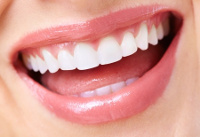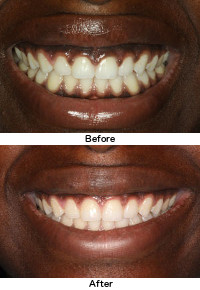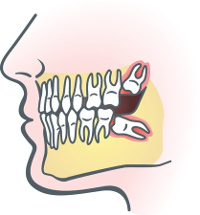What is Laser Gum Recontouring?
January 15th, 2015
 If you’ve ever noticed your own or your friend’s teeth appearing short and stubby, it may be from an excessive amount of gum tissue in the mouth. Heath-wise, an excess of gums is not good or bad, it simply is. Aesthetically, however, many people can feel self-conscious with the look of their smile. It can often make a person look as if they never lost their baby teeth, with their pearly whites looking too small for their mouth. A solution to remove excess gums from the mouth is by laser gum recontouring. This simple procedure can push back the amount of gums over the teeth and give a person an excellent smile.
If you’ve ever noticed your own or your friend’s teeth appearing short and stubby, it may be from an excessive amount of gum tissue in the mouth. Heath-wise, an excess of gums is not good or bad, it simply is. Aesthetically, however, many people can feel self-conscious with the look of their smile. It can often make a person look as if they never lost their baby teeth, with their pearly whites looking too small for their mouth. A solution to remove excess gums from the mouth is by laser gum recontouring. This simple procedure can push back the amount of gums over the teeth and give a person an excellent smile.
Why Choose Laser Gum Recontouring?

Many people find laser gum recontouring a simple way to relieve themselves from a gummy smile. This happens when a smile shows more gum than teeth. Often, this is caused by excess of gums, however it can also be caused by hyperactivity of the muscle that controls lip movement, or a misaligned bite. If it is caused by over-excess of gums, laser recontouring is the option that can help turn that gummy smile into a perfect smile.
It’s good to know that overcrowding of gums is not an unhealthy issue. The only time laser gum recontouring is recommended is when the gums are healthy enough to withstand the push back. Excess gums that are unhealthy gums are often caused by other issues, such as inflamed gums from bacteria or periodontal disease. At which point, other dental procedures and options are available.
For healthy gums that are overcrowding the teeth and creating a gummy smile, laser recontouring is the solution.
How Does Laser Gum Recontouring Work?
While laser gum recontouring may sound scary, it’s much safer and more efficient than the old way of recontouring, which included a scalpel and a long recovery time. Using a precise diode laser, the procedure is virtually painless. The process begins by using an anesthetic to numb the mouth. The dentist then uses the diode laser at specific points of the gums. The heat of the laser vaporizes the excess gum tissue instantly without any type of burning sensation. As well, as the laser removes the excess gums, it also seals the remaining tissue which prohibits bleeding and chance of infection.
Recovery from laser recontouring is quite simple. Depending on the amount of tissue removed, there will be a few days of swelling and discomfort. Often, the patient will eat softer foods for a few days as the healing process continues. However, for the most part, recovery is quick and results are immediate.
If you have questions about laser gum recontouring or are interested in the procedure for yourself, do no hesitate to contact Water Tower Dental. We can schedule an appointment to look at your gums and decide on a proper procedure to put your smile on the path to perfection. If that includes laser gum recontouring, we will walk you through the steps of the procedure and make certain that you are comfortable and ready for a great smile.

 Many people have serious phobias of doctors and dentists. Often it comes from past experiences that might not have gone over so well. Other times the fear lacks reason. Either way, there are ways to overcome the fear of the dentist so you can commit yourself to appointments and make sure your teeth are in great health.
Many people have serious phobias of doctors and dentists. Often it comes from past experiences that might not have gone over so well. Other times the fear lacks reason. Either way, there are ways to overcome the fear of the dentist so you can commit yourself to appointments and make sure your teeth are in great health. We all love the holidays, but it’s important to be aware of your oral health during these festive times. Taking care of your teeth and gums during the holidays is simple. All it includes is avoiding a few nasty habits and being aware of the treats that can be most harmful to your teeth. Here are our four dental health tips for the holiday season.
We all love the holidays, but it’s important to be aware of your oral health during these festive times. Taking care of your teeth and gums during the holidays is simple. All it includes is avoiding a few nasty habits and being aware of the treats that can be most harmful to your teeth. Here are our four dental health tips for the holiday season. Surprise: your wisdom teeth are no wiser than your other teeth. They’re named that because the wisdom teeth are your last to emerge, usually when you’re more mature and a little wiser. The wisdom teeth are the third molars in the back of your mouth that develop in the later years of your maturing body. While some people are able to keep their wisdom teeth, the majority of people need to have them removed. There are many reasons why a person may need their wisdom teeth removed.
Surprise: your wisdom teeth are no wiser than your other teeth. They’re named that because the wisdom teeth are your last to emerge, usually when you’re more mature and a little wiser. The wisdom teeth are the third molars in the back of your mouth that develop in the later years of your maturing body. While some people are able to keep their wisdom teeth, the majority of people need to have them removed. There are many reasons why a person may need their wisdom teeth removed.




 Website Powered by Sesame 24-7™
Website Powered by Sesame 24-7™